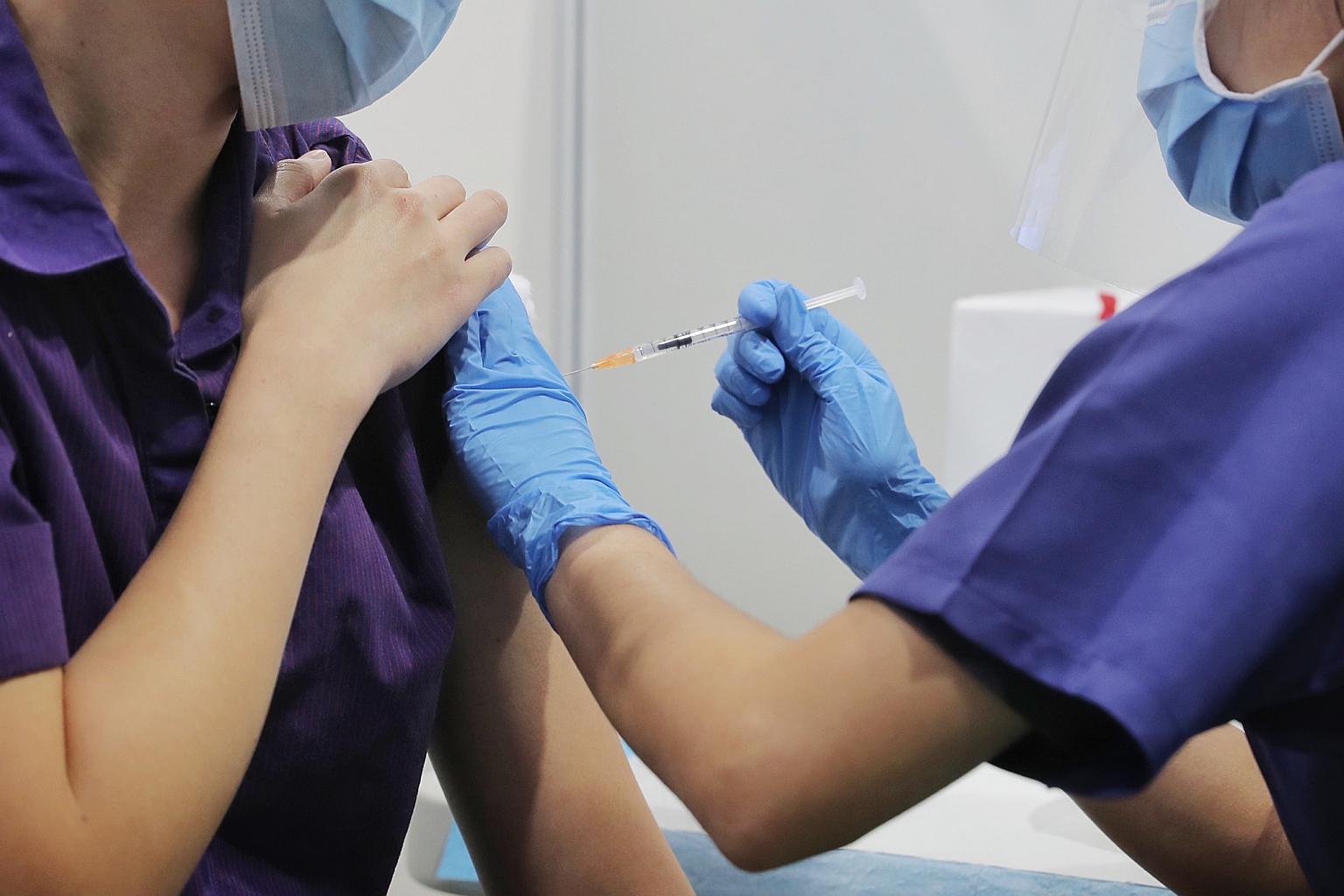Serious reactions to Covid-19 vaccinations rare, affecting four in 100,000 in Singapore
Sign up now: Get ST's newsletters delivered to your inbox

There were 95 cases of serious adverse events associated with the Covid-19 vaccine, said the HSA on May 6, 2021.
PHOTO: ST FILE
SINGAPORE - Over the four months or so since mass Covid-19 vaccination started here, 20 cases of a severe and potentially life-threatening allergic reaction known as anaphylaxis have been reported.
They are among the 95 cases of serious adverse events associated with the Covid-19 vaccine, according to the first safety update of the mRNA Covid-19 vaccines used here, from the Health Sciences Authority (HSA).
These serious effects are rare, with the cases comprising just 0.004 per cent of the more than 2.2 million doses administered from Dec 30 to April 18, said the HSA.
In all, about 0.13 per cent of the doses administered resulted in suspected adverse reactions, with the data showing that younger people are more likely to suffer side effects.
About 70 per cent of these cases involved people who were younger than 60 years old, although they made up about half of the people who have taken the vaccines.
More than four in 1,000 persons between 20 and 39 reported adverse conditions such as rashes, hives, dizziness and fever, compared with the 1.2 in 1,000 persons aged between 60 and 69 years old who reported the same reactions, said HSA.
According to the Ministry of Health (MOH), as at April 18, more than 1.36 million people here have received the first dose of the Covid-19 vaccine and nearly 850,000 people have completed the vaccination regimen by taking both doses.
The HSA defines an adverse effect as serious when it results in hospitalisation, extended stay in hospital, a significant reduction in functional capacity, or a life-threatening event like anaphylaxis, or death.
No one here has died from taking the Covid-19 vaccine. There have also been no reports of unusual blood clots associated with low platelets that have been reported with other types of Covid-19 vaccines overseas, said the HSA.
The HSA data covers mostly those who had taken the Pfizer-BioNTech vaccine because this was available since Dec 30. The Moderna vaccine arrived here only in March.
Anaphylaxis remains the greatest concern because it is potentially life threatening. The reaction typically happens very quickly. Within minutes of getting the vaccine, a person who has it may experience swelling of the face, eyes and lips. Their airway can be constricted and there may be nausea, vomiting and diarrhoea.
Some people can take longer to experience this, which is why the authorities want everyone who is taking the vaccine to be observed for 30 minutes afterwards. Every vaccination centre will also have a team of medical professionals on duty.
The onset of symptoms for 6 in 10 of these anaphylaxis cases came within the 30-minute observation period after the vaccine was given.
HSA said that 80 per cent of those who suffered from anaphylaxis were women, 55 per cent of whom had a history of allergies to drugs or food.
All the people who developed anaphylaxis after taking the vaccine have recovered after medical treatment, said the HSA. The incidence rate of this reaction here is about 1.4 per 100,000 doses administered, which is similar to the incidence rates reported overseas of around 0.5 to two per 100,000 doses administered.
Anaphylaxis is a reaction that has been reported with the use of other vaccines, as is Bell's palsy, a condition where there is a temporary paralysis of a part of the facial muscle, which the HSA is also monitoring closely.
There have been 25 cases here of Bell's palsy, which is caused by the inflammation of the facial nerve, and most are not serious. Most patients recover from it completely, even without treatment, the HSA said.
The 25 cases work out to a rate of 3.45 per 100,000 people per month, which is within the expected incidences of 1.1 to 4.4 per 100,000 people per month prior to the introduction of vaccination, said the HSA.
In the group of 95 with suspected adverse events, another 20 had severe allergic reactions that included severe rashes, possible shortness of breath and rapid heartbeat. The rest experienced breathing difficulty, fast heart rate, an increase or decrease in blood pressure, chest discomfort, fainting, limb numbness or pain that lasted for a few days, changes in vision and increase in liver enzymes, said the HSA update. Most of the 95 cases were reported to have recovered or are recovering.
They are among a bigger group of 2,796 cases of adverse effects associated with the vaccine, according to the HSA data.
So far, the most commonly reported suspected side effects of getting a Covid-19 vaccine are rashes, hives, dizziness, swelling of eyelids, face or lips, fever, shortness of breath, muscle aches and pain, headache, and itchy skin, said the HSA.
It said heart attacks and strokes can occur naturally in people, regardless of whether they are vaccinated or not.
The HSA, which will continue to monitor the safety of the vaccines, will be releasing vaccine safety updates on a monthly basis from now on.
This report comes amid a surge in the number of community infections here, with locally transmitted cases rising to 62 in the past week, from 13 in the week before. Most of them are linked to the Tan Tock Seng Hospital cluster. Most people in the cluster who had been fully vaccinated showed mild or no symptoms.


